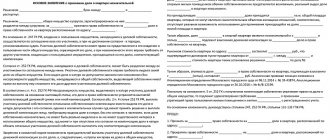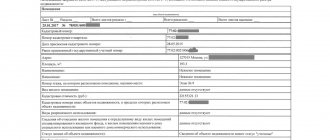Registration of ownership of real estate
1. GENERAL PROVISIONS
1.1. This Privacy Policy regarding the processing of personal data of users of the site https://www.dvitex.ru/ (hereinafter referred to as the Privacy Policy) was developed and applied by Legal LLC, OGRN 1107746800490, Moscow, per. Golutvinsky 1st, building 3-5, office 4-1 (hereinafter referred to as the Operator) in accordance with paragraphs. 2 hours 1 tbsp. 18.1 of the Federal Law of July 27, 2006 No. 152-FZ “On Personal Data” (hereinafter referred to as the Law on Personal Data).
1.2. This Privacy Policy defines the Operator’s policy regarding the processing of personal data accepted for processing, the procedure and conditions for the processing of personal data of individuals who have transferred their personal data for processing to the Operator (hereinafter referred to as personal data subjects) with and without the use of automation tools, establishes procedures aimed at preventing violations of the legislation of the Russian Federation, eliminating the consequences of such violations related to the processing of personal data.
1.3. The privacy policy was developed to ensure the protection of the rights and freedoms of personal data subjects when processing their personal data, as well as to establish the responsibility of the Operator's officials who have access to the personal data of personal data subjects for failure to comply with the requirements and standards governing the processing of personal data.
1.4. Personal data of the Personal Data Subject is any information relating to a directly or indirectly identified or identifiable individual.
1.5. The Operator processes the following personal data of Users:
- Full Name;
- E-mail address;
- Phone number;
- other data necessary for the Operator when providing services to Users to ensure the functioning of the Site.
1.6. The Operator processes personal data of Personal Data Subjects for the following purposes:
- providing the opportunity for feedback from Operator Specialists on User requests;
- providing the possibility of online payment for services ordered on the Site;
- ensuring the fulfillment of the Operator’s obligations to Users;
- for market research purposes;
- informing the Personal Data Subject about promotions, competitions, special offers, new services, discounts, advertising materials and other services, as well as receiving commercial or advertising information and free products, participating in exhibitions or events, performing marketing research and notification of all special initiatives for clients;
- statistical purposes;
- for other purposes, if the corresponding actions of the Operator do not contradict the current legislation, the activities of the Operator, and the consent of the Personal Data Subject has been obtained for the said processing.
1.7. The operator processes personal data of personal data subjects by performing any action (operation) or set of actions (operations) performed using automation tools or without the use of such means, including the following:
- collection;
- record;
- systematization;
- accumulation;
- storage;
- clarification (update, change);
- extraction;
- usage;
- transmission (distribution, provision, access);
- depersonalization;
- blocking;
- deletion;
- destruction.
2. PRINCIPLES FOR PROCESSING PERSONAL DATA
2.1. When processing personal data, the Operator is guided by the following principles:
- legality and justice;
- confidentiality;
- timeliness and reliability of obtaining the consent of the subject of personal data for the processing of personal data;
- processing only personal data that meets the purposes of their processing;
- compliance of the content and volume of processed personal data with the stated purposes of processing. The personal data processed should not be redundant in relation to the stated purposes of their processing;
- the inadmissibility of combining databases containing personal data, the processing of which is carried out for purposes incompatible with each other;
- storing personal data in a form that allows identifying the subject of personal data for no longer than required for the purposes of processing personal data;
- destruction or depersonalization of personal data to achieve the goals, their processing or in case of loss of the need to achieve these goals.
2.2. The processing of personal data by the Operator is carried out in compliance with the principles and rules provided for:
- Federal Law of July 27, 2006 No. 152-FZ “On Personal Data”;
- This Privacy Policy;
- Universal Declaration of Human Rights 1948;
- International Covenant on Civil and Political Rights 1966;
- European Convention for the Protection of Human Rights and Fundamental Freedoms, 1950;
- The provisions of the Convention of the Commonwealth of Independent States on Human Rights and Fundamental Freedoms (Minsk, 1995), ratified by the Russian Federation on August 11, 1998;
- The provisions of the Okinawa Charter for the Global Information Society, adopted on July 22, 2000;
- Decree of the Government of the Russian Federation dated November 1, 2012 No. 1119 “On approval of requirements for the protection of personal data during their processing in personal data information systems”;
- Order of the FSTEC of Russia dated February 18, 2013 No. 21 “On approval of the composition and content of organizational and technical measures to ensure the security of personal data when processed in personal data information systems”;
- Other regulatory and non-regulatory legal acts governing the processing of personal data.
3. OBTAINING PERSONAL DATA.
3.1. Personal data of personal data subjects is obtained by the Operator:
- by providing the subject with personal data when registering on the Site, when submitting applications, applications, questionnaires, forms, filling out registration forms on the Operator’s website or sending by e-mail, messages by telephone to the Operator’s support service;
- by other means that do not contradict the legislation of the Russian Federation and the requirements of international legislation on the protection of personal data.
3.2. The Operator receives and begins processing the Subject’s personal data from the moment of receiving his consent.
3.3. Consent to the processing of personal data is given by the subject of personal data from the moment of starting to use the site, including by indicating about, through the performance of implied actions by the subject of personal data.
3.4. The subject of personal data may at any time withdraw his consent to the processing of personal data. To revoke consent to the processing of personal data, you must submit a corresponding application to the Operator via available means of communication. At the same time, the Operator must stop processing them or ensure the termination of such processing and, if the preservation of personal data is no longer required for the purposes of their processing, destroy personal data or ensure their destruction within a period not exceeding 30 (Thirty) days from the date of receipt of the specified review .
3.5. If the Personal Data Subject withdraws consent to the processing of personal data, the Operator has the right to continue processing personal data without the consent of the Personal Data Subject only if there are grounds specified in the Personal Data Law.
3.6. The subject of personal data has the right to choose what personal data will be provided to him. However, in case of incomplete provision of the necessary data, the Operator does not guarantee the subject’s ability to use all services and products of the Site, to use all services of the Site.
3.7. The personal data subject can view, update or delete any personal data included in his profile at any time. To do this, he can edit his profile online in his personal account or send an email to
4. PROCESSING PROCEDURE FOR PERSONAL DATA
4.1. The operator takes technical, organizational and legal measures to ensure the protection of personal data from unauthorized or accidental access, destruction, modification, blocking, copying, distribution, as well as from other unlawful actions.
4.2. When processing personal data, the Operator applies legal, organizational and technical measures to ensure the security of personal data in accordance with Art. 19 of the Federal Law “On Personal Data”, Decree of the Government of the Russian Federation dated November 1, 2012 No. 1119 “On approval of requirements for the protection of personal data during their processing in personal data information systems”, Methodology for determining current threats to the security of personal data during their processing in personal information systems data approved by the FSTEC of the Russian Federation on February 14, 2008, Methodological recommendations for ensuring the security of personal data using crypto-means when processing them in personal data information systems using automation tools approved by the FSB of the Russian Federation on February 21, 2008 No. 149/54-144.
4.3. To authorize access to the Site, a Login and Password are used. The subject of personal data is responsible for the safety of this information. The subject of personal data does not have the right to transfer his own Login and Password to third parties, and is also obliged to take measures to ensure their confidentiality.
4.4. When transferring personal data, the Operator complies with the following requirements:
- does not disclose the personal data of the subject of personal data to a third party without expressed consent, except in cases where this is necessary for the purposes of processing personal data, preventing a threat to the life and health of the subject of personal data, as well as in cases established by law;
- does not disclose personal data for commercial purposes without the expressed consent of the subject of personal data;
- informs persons receiving personal data that this data can only be used for the purposes for which it was communicated, and requires these persons to take appropriate measures to protect personal data. Persons receiving the User’s personal data are required to maintain confidentiality;
- allows access to personal data only to authorized persons, and these persons must have the right to receive only those personal data that are necessary to perform specific functions.
4.5. The Operator has the right to disclose any information collected about the User of this Site if disclosure is necessary in connection with an investigation or complaint regarding unlawful use of the Site, or to identify (identify) a User who may violate or interfere with the rights of the Site Administration or the rights of other Site Users, as well as to comply with the provisions of current legislation or court decisions, ensure compliance with the terms of this Agreement, protect the rights or safety of other Users and any third parties.
4.6. Third parties independently determine the list of other persons (their employees) who have direct access to such personal data and (or) process it. The list of these persons, as well as the procedure for access and/or processing of personal data by them, is approved by the internal documents of the Third Party.
4.7. The operator does not sell or provide personal data to third parties for marketing purposes not provided for in this Privacy Policy, without the express consent of the personal data subjects. The operator may combine anonymized data with other information received from third parties and use it to improve and personalize services, content and advertising.
4.8. Processing of personal data is carried out on the territory of the Russian Federation; cross-border transfer of personal data is not carried out. The operator reserves the right to choose any channels for transmitting information about personal data, as well as the content of the transmitted information.
4.9. Personal information collected online is stored by the Operator and/or service providers in databases protected by physical and electronic controls, access control technology and other appropriate security measures.
4.10. The personal data subject understands, confirms and agrees that the technical processing and transmission of information on the Operator’s Website may involve the transfer of data over various networks, including unencrypted communication channels on the Internet, which is never completely confidential and secure.
4.11. The personal data subject also understands that any messages and/or information sent through the Operator’s Server may be unauthorized read and/or intercepted by third parties.
5. FINAL PROVISIONS
5.1. In the event of any disputes or disagreements related to the implementation of these Rules, the Personal Data Subject and the Operator will make every effort to resolve them through negotiations between them. If disputes are not resolved through negotiations, disputes shall be resolved in the manner established by the current legislation of the Russian Federation.
5.2. This Privacy Policy comes into force for the Personal Data Subject from the moment he starts using the Operator’s Website and is valid for an indefinite period.
5.3. This Privacy Policy can be changed and/or supplemented by the Operator at any time during the validity period of the Rules at its discretion without the need to obtain the consent of the Personal Data Subject. All changes and/or additions are posted by the Operator in the appropriate section of the Site and come into force on the day of such posting. The subject of personal data undertakes to promptly and independently familiarize himself with all changes and/or additions. If the Personal Data Subject does not agree with the changes made, he is obliged to refuse access to the Site and stop using the materials and services of the Site.
GLAVBUKH-INFO
The correct determination of the date of transfer of ownership of purchased goods, raw materials, supplies (hereinafter referred to as MPZ) is undoubtedly important. This can directly affect the moment of their acceptance for registration and the cost of inventories. And indirectly - for example, for VAT calculations. However, it is sometimes very difficult for an accountant to find out at what point ownership of acquired inventories passes. It is clear that for this you first need to read the contract. But often a contract is not enough.The moment of transfer of ownership is determined by the contract
The ideal situation is when the contract clearly states the moment of transfer of ownership of the inventory from the supplier to the buyer. Formulations may vary. For example, at the time of “shipment from the supplier’s warehouse”, “loading on board the vessel”, “arrival at the destination station”. Or, say, “at the time of registration at customs of the declaration for imported goods.” In this case, all that remains is to correctly determine the date. The relevant documents (copies thereof) will help here. For example, supplier shipping documents, bill of lading, railway waybill, import declaration for goods.
The moment of transfer of ownership is not specified in the contract
Unfortunately, life is far from ideal, and contracts that do not specify the moment of transfer of ownership are quite common.
Agreement with Russian supplier
In this case, ownership of the purchased goods and materials is transferred: - delivery is the responsibility of the supplier - on the date of delivery of goods and materials to the buyer (consignee); - the contract provides for pick-up - on the date the goods are made available to the buyer at the warehouse.
Note. The goods are considered provided when, by the agreed date, they are ready for delivery in the appropriate place (in particular, marked or otherwise identified) and the buyer is aware of the readiness of the goods for delivery;
The goods are delivered by the carrier (by mail) - on the date of transfer of the goods to the carrier or to the post office; — the buyer receives the goods on the basis of the seller’s shipping document (for example, a warehouse receipt, bill of lading) from the third party who has the goods, on the date of transfer of such a document to the buyer.
Agreement with a foreign supplier
In this case, you first need to find out what legislation to follow to determine the moment of transfer of ownership. The following situations are possible. SITUATION 1. On the issue of transfer of ownership, the contract directly refers to any legislation. If this is Russian legislation, then the same rules apply as in the case of an agreement with a domestic seller. If it’s foreign, say the supplier’s country, you can turn to the counterparty for help. SITUATION 2. The contract does not indicate which country’s law applies to the transfer of ownership. In this case, the moment of transfer of ownership, as a general rule, is determined: - the contract is concluded in relation to the goods that are in transit at that moment, - by the legislation of the country from which the goods were sent; - the contract was concluded in relation to other property and property - by the legislation of the country where the property was located at the time of conclusion of the contract.
Note. The seller and buyer can agree on the law that will govern their rights and obligations under the foreign trade contract. But without a special clause in the contract, this right of contract will not apply to the emergence and termination of property rights. That is, it may, for example, turn out that the law of the contract is Russian law. But the moment of transfer of ownership must be determined according to the law of the supplier’s country in which the goods were located at the conclusion of the contract.
In both situations, the foreign law by which the moment of transfer of ownership must be determined is usually the law of the seller’s country. This means that he can be asked to explain how the moment of transfer of ownership is determined in his country.
Incoterms and transfer of ownership In practice, accountants often prefer to take the path of least resistance. They do not study foreign legislation in search of an answer. Instead, they recognize the transfer of ownership on the date the risk of accidental loss and damage to the goods passes. And it, in turn, is determined in accordance with the terms of delivery according to Incoterms.
Incoterms (International Commercial Terms) are international rules for the interpretation of trade terms most often used in foreign trade, relating to the rights and obligations of the parties to a purchase and sale agreement regarding the delivery of goods sold.
For example, according to the terms of delivery CIP - Krasnodar, Russia (Incoterms 2000), the risk of loss and damage to the goods passes from the seller to the buyer at the moment the goods are transferred by the seller to the carrier. Let's say the transfer took place in Warsaw. Accordingly, the accountant recognizes the transfer of ownership on the day the inventory is transferred to the carrier in Warsaw. Let’s say, under the terms of delivery DAF - Torfyanovka village, Vyborg region, Russia (Incoterms 2000), the risks pass at the moment of delivery of the goods to Torfyanovka. And the accountant, relying solely on the transfer of risks according to Incoterms, recognizes the transfer of ownership on the day when the MPZ arrives in Torfyanovka. But the fact is that Incoterms regulate the transfer only of the risks of loss or damage to goods from the seller to the buyer! This means that the mere mention of delivery terms according to Incoterms does not mean that the parties to the contract have determined the date of transfer of ownership. Nevertheless, there is an opinion that this approach has the right to life.
FROM AUTHENTIC SOURCES
EFREMOVA ANNA ALEKSEEVNA - General Director of the Audit Office “As far as I know, in the law of other countries, in contrast to Russian civil legislation, the moment of transfer of ownership is extremely rare. The fact is that in this case the concept of transfer of ownership is replaced by the concept of transfer of risks. Therefore, the accountant, recognizing the transfer of ownership on the date of transfer of the risks of loss and damage to the goods according to Incoterms, does everything correctly. And I don’t see the need to come up with anything else other than Incoterms. Judge for yourself: if we separate the moments of transfer of ownership and transfer of risks, we will get insoluble conflicts. Suppose that in September, during shipment in Siberia, the ownership of 10 tons of oil pumped into the pipeline was transferred, and in October, when crossing the border or at some other moment, the risks were transferred, but for 9 tons of oil, since 1 ton “did not arrive” (loss). The buyer considers himself obligated to pay 9 tons. To whom then did we sell (transfer ownership) another 1 tons? In other words, it is impossible to transfer ownership separately from risks, since risks are the burden of maintaining the property. The same will happen when purchasing. So the accountant, in my opinion, is right.”
In other words, if an accountant, instead of studying the norms of foreign legislation on the issue of transfer of ownership, focuses on the transfer of risks according to Incoterms, he has every chance of guessing the correct date. But so that there are no conflicts and the accountant does not act as a fortune teller, it is enough to directly state in the contract that the buyer’s ownership of the goods arises on the date of transfer of the risks of loss and damage to the goods in accordance with the terms of delivery according to Incoterms.
Date of import clearance at customs and transfer of ownership Quite often, instead of the date of transfer of ownership (when the latter is not specified in the contract), accountants use the date of registration of the goods declaration (or the date of release from customs) in accounting. For example, when determining the exchange rate to calculate the ruble value of purchased inventories. But if in the case of risks according to Incoterms it turns out that prerequisites not based on law often lead to the correct result, then everything is different here. The legislation of no country does not link the transfer of ownership of imported goods with their customs clearance. This means that this approach is obviously wrong. The only case where it may be applicable is if it is expressly stated in the contract that ownership passes at the time of customs clearance.
* * * Determining the date of transfer of ownership is a matter of civil law. Its incorrect definition in the first place may lead to disagreements with the seller. But tax consequences are also likely. These are quite compelling arguments to convince management that this date needs to be clearly stated in contracts. And, if necessary, make changes to existing contracts. Especially foreign economic ones. After all, it is clear that an accountant has neither the desire nor the special ability to study foreign legislation. And even if the accountant copes with this, then in the event of an audit he will still have to explain this to the inspectors. And this is also not an easy task.
——————————— clause 1 of Art. 223, paragraphs. 1, 3 tbsp. 224, art. 458 Civil Code of the Russian Federation, clause 1, art. 458 Civil Code of the Russian Federation, clause 3, art. 1206, paragraph 1, art. 1210, paragraph 2 of Art. 1215 Civil Code of the Russian Federation, clause 2, art. 1206 Civil Code of the Russian Federation, clause 1, art. 1206 Civil Code of the Russian Federation, clause 1, art. 1210 Civil Code of the Russian Federation, clause 3, art. 1206, paragraph 2 of Art. 1215 Civil Code of the Russian Federation
https://glavkniga.ru/ https://www.facebook.com/G.kniga https://ok.ru/glavkniga https://vk.com/glavkniga
Magazine "General Ledger" N02, 2016
Kalinichenko E.
| Next > |







